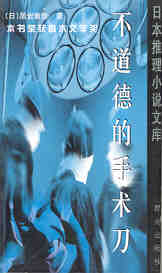04道德经英译本85种-第412部分
按键盘上方向键 ← 或 → 可快速上下翻页,按键盘上的 Enter 键可回到本书目录页,按键盘上方向键 ↑ 可回到本页顶部!
————未阅读完?加入书签已便下次继续阅读!
and fairness); to spontaneous filial and paternal piety。
Reject art and gain; and evildoers will disappear。 (With the primordial simplicity; they will return to primordial honesty)。
Renounce these three artificial categories; for the artificial is good…for…nothing。
Be attached to simplicity and naturalness。 Have few personal interests; and few desires。
20
Give up learning; and you will be free from all your worries。 What is the difference between yes and no (about which the rhetoricians have so much to say)? What is the difference between good and evil (on which the critics never agree)? (These are futilities that prevent the mind from being free。 Now freedom of mind is necessary to enter into relation with the Principle)。
Without doubt; among the things which common people fear; there are things that should be feared; but not as they do; with a mind so troubled that they lose their mental equilibrium。
Neither should one permit oneself to lose equilibrium through pleasure; as happens to those who have a good meal or view the surrounding countryside in spring from the top of a tower (with the accompaniment of wine; etc。)。 I (the Sage) seem to be colourless and undefined; neutral as a new…born child that has not yet experienced any emotion; without design or aim。
The common people abound (in varied knowledge); but I am poor (having rid myself of all uselessness) and seem ignorant; so much have I purified myself。
They seem full of light; I seem dull。 They seek and scrutinize; I remain concentrated in myself。 Indeterminate; like the immensity of the oceans; I float without stopping。
They are full of talent; whereas I seem limited and uncultured。 I differ thus from the common people; because I venerate and imitate the universal nourishing mother; the Principle。
21
All of the beings which play a role; in the great manifestation of the cosmic theater; have come from the Principle; through its virtue (its unwinding)。
The Principle is indistinct and indeterminate; mysterious and obscure。 In its indistinction and indetermination there are types; a multitude of beings。 In its mystery and obscurity there is an essence which is reality。
From ancient times until the present; its name (its being) has stayed the same; all beings have come from it。
How do I know that it was the origin of all beings? 。。。 (By objective observation of the universe; which reveals that contingencies must have come from the absolute)。
22
In the old days they said; the incomplete shall be made whole; the bent shall be straightened; the empty shall be filled; the worn shall be renewed。 Simplicity makes for success; multiplicity leads one astray。
Therefore the Sage who holds himself to unity; is the model for the empire; (for the world; the ideal man)。
He shines; because he does not show off。 He imposes himself because he does not claim to be right。 One finds merit in him; because he does not brag。 He increases constantly because he does not push himself。
As he does not oppose himself to anyone; no one is opposed to him。
The axioms from the old days cited above; are they not full of sense? Yes; towards him who is perfect; (who does nothing to attract to himself); all run spontaneously。
23
To talk little; to act only without effort; that is the formula。 A gusty wind does not blow all morning; torrential rain does not last all day。
And yet these effects are produced by heaven and earth; (the most powerful agents of all。 But these are exaggerated; forced effects; that is why they cannot be sustained)。 If heaven and earth cannot sustain a forced action; how much less is man able to do so?
He who conforms himself to the Principle; conforms his principles to this Principle; his actions to the action of this Principle; his non…action to the non…action of this Principle。
Thus his principles; his actions; his non…action; (speculations; interventions; abstentions); always give him the contentment of success; (for; whether he succeeds or not; the Principle evolves; and therefore he is content)。
(This doctrine of the abnegation of one's opinions and one's actions appeals to the taste of but few people)。 Many only believe in it a little; the others not at all。
24
By dint of holding oneself on tiptoe; one loses one's balance。 By trying to take too great a stride; one does not go forward。
By making a show of oneself; one loses one's reputation。 Through imposing oneself; one loses one's influence。
Through boasting about oneself; one becomes discredited。 Through pushing oneself; one ceases to be augmented。
In the light of the Principle all these ways of acting are odious; distasteful。 They are superfluous excesses。 They are like a pain in the stomach; a tumour in the body。 He who has principles (in conformity with the Principle); does not act like this。
25
There is a being; of unknown origin; which existed before heaven and earth; imperceptible and undefined; unique and immutable; omnipresent; the mother of everything there is。
I do not know it by its own name。 I designate it by the word Principle。 If it were necessary to name it; one would call it the Great;
great going forth; great distance; great return。 (The principle of the great cyclic evolution of the cosmos; of the becoming and ending of all beings)。
The name Great befits (proportionally) four (superimposed) beings: The emperor; the earth; heaven (the classical Chinese triad); and the Principle。
The emperor owes his greatness to the earth (his theater); earth owes its greatness to heaven (of which it is the fruit); heaven owes its greatness to the Principle (of which it is the principal agent)。 (Greatness borrowed; as one can see; whereas) the Principle owes its essential greatness to its underived; uncreated existence。
26
The heavy is the base (root) of the light。 Stillness is the prince of movement。 (These things should be always united in a just temperament)。
Therefore a wise prince; when he travels (in his light carriage); never separates himself from the heavy wagons which carry his baggage。 However beautiful the landscape through which he passes; he takes care to lodge only in peaceful places。
Alas; how could an emperor behave so foolishly;
losing all authority by dint of frivolity; and all the rest through his waywardness?
27
A good walker leaves no trace; a good speaker offends no one; a good reckoner needs no tally;
an expert locksmith can make one that no one can open; an expert on knots can make them so that no one can untie them。 (all specialists have their speciality; which makes their fame; from which they take their profit)。
Likewise the Sage (Confucian politician); the professional saviour of men and things; has his own procedures。
He considers himself as the born master of other men; regarding them as material born for his craft。 Now that is to blind oneself; (to shade out the light; the Daoist principles)。
Not wishing to rule; nor to appropriate; others; although wise; seeming like a madman (persisting to live in retreat); this is the essential truth。
28
Being aware of one's virile strength (knowing that one is a cock); and yet holding oneself willingly in the inferior state of the female (of the hen); keeping oneself willingly in the lowest place in the empire 。。。 To demean oneself thus shows that one has retained the primordial virtue; (absolute disinterestedness; participation in the Principle)。
Knowing oneself to be enlightened; and willingly passing oneself off as ignorant; willingly letting oneself be walked over 。。。 To behave thus is to show that the primordial virtue has not wavered in oneself; that one is still united with the first Principle。
Knowing oneself worthy of fame; yet staying in voluntary obscurity; willingly making oneself the valley (the lowest point) of the empire 。。。 To behave thus is to show that one has the original self…sacrifice still intact that one is still in the state of natural simplicity。
(The Sage will refuse therefore the burden of being a governor。 If he is constrained to accept such a post; then he will remind himself that) the multiplicity of beings have come from the primordial unity by a scattering。 (That he will never busy himself with these diverse beings); but govern as chief of the officials (as prime mover); uniquely applying himself to general government; without occupying himself with details。
29
He who holds the empire would; in my view; be wishing for failure should he want to manipulate it (to act positively; to govern actively)。
The empire is a mechanism of extreme delicacy。 It should be let go all alone。 It should not be touched。 He who touches it; deranges it。 He who wishes to appropriate it; loses it。
When he governs; the Sage lets all people (and their sum; the empire) go free according to their several natures; the agile and the slow; the ardent and the apathetic; the strong and the weak; the long…lived and the short…lived。
He limits his action to the suppression of excesses which would harm the whole; such as power; wealth; and ambition。
30
(of all the excesses; the most prejudicial; the most damnable; as that of weapons; war)。 Those who act as advisors to a prince should keep themselves from wanting to make war against a country。 (For such action; calling for revenge; is always paid for dearly)。
Wherever the troops stay the land produces only thorns; having been abandoned by the farm workers。 Wherever a great army has passed; years of unhappiness (from famine and brigandage) follow。
Therefore the good general is content to do only what he has to do; (the least possible; moral; rather than material repression)。 He stops as soon as possible; guarding himself from exploiting his force to the limit。
He does as much as is required (to reestablish peace); not for his personal advantage and fame; but from necessity and with reluctance; without any intention of increasing his power。
Any height of power is always followed by decadence。 Making oneself is therefore contrary to the Principle (the source of duration)。





